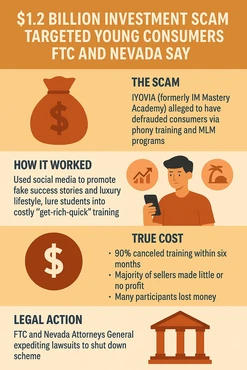False claims on social media lured young people into costly programs
May 5, 2025
- The FTC and Nevada Attorney General allege IYOVIA (formerly IM Mastery Academy) defrauded consumers out of $1.2 billion.
-
The scheme used false claims and social media marketing to lure young people into costly, deceptive training and MLM programs.
-
The action aims to halt the scam, which promoted fake success stories and promised quick riches with little evidence of actual profits.
In a major crackdown, the Federal Trade Commission (FTC) and the state of Nevada are jointly suing an expansive investment and business venture scam that, according to authorities, has drained more than $1.2 billion from consumers. The case centers around IYOVIA, formerly operating under brand names like IM Mastery Academy, iMarketsLive, and IM Academy.
 The complaint, filed by both agencies, alleges that IYOVIA and its top executives enticed consumersespecially young adultsthrough false promises of easy earnings and flashy marketing on social media.
The complaint, filed by both agencies, alleges that IYOVIA and its top executives enticed consumersespecially young adultsthrough false promises of easy earnings and flashy marketing on social media.
The scam offered training in financial topics and a multi-level-marketing (MLM) opportunity, convincing people to pay up to $400 a month to participate and recruit others.
Christopher Mufarrige, Director of the FTCs Bureau of Consumer Protection, called the scheme remarkable in its scope, criticizing its aggressive marketing tactics and unqualified trainers. The harm to consumersespecially young people seeking to earn a livingis immense and ongoing, Mufarrige said in a news release.
Success stories, fast money
The investigation revealed disturbing facts:
-
Social media posts often flaunted supposed success stories, luxury lifestyles, and promises of fast money, enticing students and young professionals.
-
Despite big claims, IYOVIAs own records show 60% of customers canceled within one month, and 90% quit within six months.
-
The majority of MLM participants made little to no profit, with many losing money altogether.
Named in the lawsuit are company owners Chris and Isis Terry, and key figures Jason Brown, Alex Morton, Matthew Rosa, and Brandon Boyd. The defendants are accused of violating multiple laws, including the FTC Act, the Telemarketing Sales Rule, and Nevadas consumer protection laws.
The lawsuit is seen as a critical step in curbing predatory practices that exploit vulnerable consumers, with officials urging the public to remain skeptical of get-rich-quick promises, especially those proliferating across social media.
Sign up below for The Daily Consumer, our newsletter on the latest consumer news, including recalls, scams, lawsuits and more.
.newsletter-form {
display: flex;
max-width: 400px;
margin: 20px auto;
background: #f8f9fa;
padding: 10px;
border-radius: 8px;
box-shadow: 0 4px 6px rgba(0, 0, 0, 0.1);
}
.newsletter-input {
flex: 1;
padding: 10px;
border: 1px solid #ccc;
border-radius: 5px 0 0 5px;
font-size: 16px;
outline: none;
}
.newsletter-input:focus {
border-color: #007bff;
}
.newsletter-button {
background: #2976D1;
color: white;
border: none;
padding: 10px 15px;
font-size: 16px;
border-radius: 0 5px 5px 0;
cursor: pointer;
transition: background 0.3s ease;
}
.newsletter-button:hover {
background: #0056b3;
}
#FTC #Nevada #sue #billion #039investment #scam039